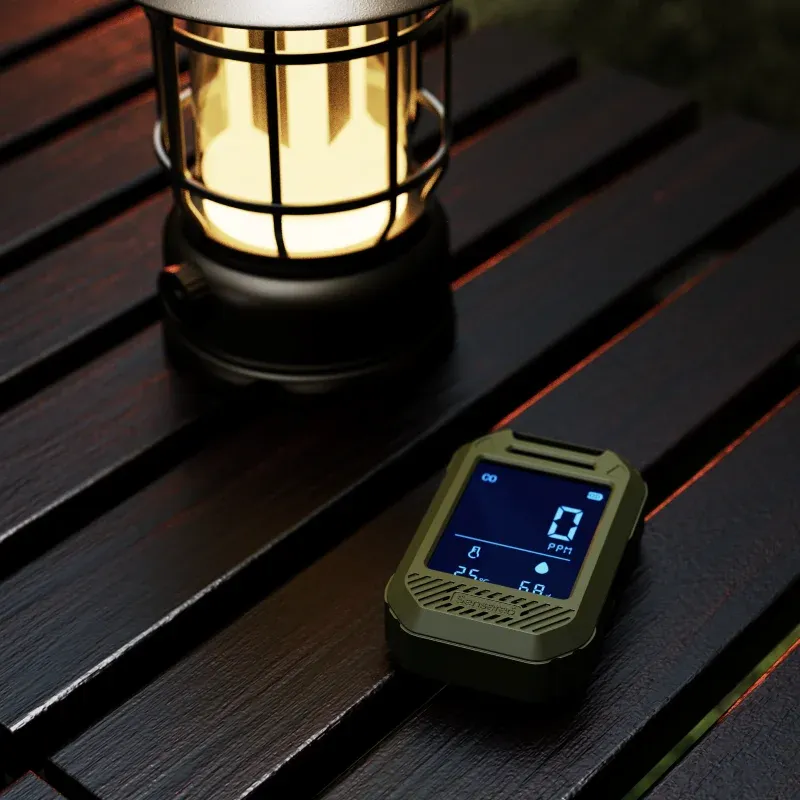
Brief Summary:
For maximum safety and convenience, a plug-in smoke detector (specifically, a hardwired alarm with a battery backup) is generally the superior choice, as it provides a constant power source and wireless interconnectivity. However, modern battery-operated detectors have largely closed the gap. Thanks to innovations like sealed, 7-year batteries and protocols like Matter, a high-quality matter smoke detector can offer a comparable level of reliability and peace of mind without the need for complex wiring, making it the ideal choice for renters, apartments, and any home where rewiring is not an option.
Plug-In vs. Battery Operated Detectors: Which is Better for Your Home?
Choosing a new smoke detector for your home seems like a simple task, but the options available can be surprisingly varied. One of the most common decisions you’ll face is the choice between a battery-operated detector and a plug-in model. Each has distinct advantages and disadvantages that can impact everything from installation and maintenance to overall reliability.
This comprehensive guide will break down the pros and cons of each type, answer the most common questions about them, and help you determine which option is truly better for your home. We’ll also explore how modern technology from long-lasting batteries to the new Matter standard has completely changed the debate.
The Case for Battery-Operated Detectors
The most recognizable type of detector, battery-operated units, are prized for their simplicity and flexibility. They are the ideal choice for a variety of living situations, from apartments and rental homes to older houses where a complex electrical installation is not feasible.
Pros of Battery-Operated Detectors:
Effortless Installation: Battery detectors are the ultimate “DIY” solution. You can install them anywhere you need to with just a few screws or, in some cases, with a simple peel-and-stick mount. There is no need for an electrician or any complicated wiring.
Protection During Power Outages: Since they are not connected to your home’s electrical system, a battery-powered smoke detector will continue to function seamlessly even if the power goes out. This is a vital safety feature, as home fires can often occur during storms or power surges.
Cost-Effective and Portable: The initial purchase price for a battery-operated detector is often lower than its wired counterparts. Their portability also means they can easily be moved if you relocate, ensuring you take your safety with you.

The Challenges: The Dreaded “Chirp” and Maintenance
Despite their convenience, traditional battery-operated detectors come with a major drawback: maintenance. They rely on a power source that must be managed, and if forgotten, they will let you know in the most annoying way possible.
What batteries do smoke detectors use? Most traditional battery alarms use a 9-volt battery, though some newer models use AA or AAA batteries, which can last longer.
How long do batteries last in a smoke detector? A standard 9V battery typically lasts for about six to twelve months. This means you must manually check and replace the batteries at least once a year, a task that many people forget. The result is the infamous, high-pitched “chirp” that signals a low battery, usually in the middle of the night.
The Problem with Smoke Detector Battery Replacement: The need for consistent battery replacement can be a serious safety issue. An astounding number of fire-related deaths are linked to smoke detectors with dead or missing batteries.
The good news is that modern technology has largely solved these problems. For example, the Sensereo MS-1 matter smoke detector is a prime example of a device with a dual-battery system, where the core smoke sensor is powered by a sealed, 7-year battery, while a separate battery powers its smart features, giving you the best of both worlds.
The Case for Plug-In and Hardwired Detectors
Often confused with each other, true plug-in detectors are less common than hardwired ones, but the terms are often used interchangeably to mean a device that relies on a constant power source.
Pros of Plug-In Detectors:
Constant Power: A plug in smoke detector that is hardwired into your home’s electrical system receives a constant stream of power. This eliminates the need for any kind of battery management.
Reliability: With continuous power and a hardwired connection, there is virtually no risk of a dead battery preventing the detector from working. This provides a very high degree of reliability.
Wired Interconnectivity: The most significant advantage of hardwired detectors is their ability to be interconnected. If one alarm detects smoke, it triggers all the other hardwired detectors in your home, ensuring that everyone in the house is alerted to the danger, regardless of where they are sleeping.
The Challenges: Location and Installation
The biggest drawbacks to hardwired detectors are tied to their permanence.
Limited by Wiring: A hardwired detector must be installed where there is an existing electrical connection, which may not always be the optimal location.
Complex Installation: Installing a hardwired system requires specialized electrical work, which can be expensive and time-consuming. This makes them a less practical choice for renters or for rooms that lack existing wiring.
Backup Battery Still Needed: While they don’t need a primary battery, hardwired detectors still require a backup battery (usually a 9V or a sealed lithium battery) to ensure they function during a power outage. This means you still have some maintenance to perform.
The Best of Both Worlds: The Modern Smart Detector
Today, the debate isn’t just about power source. It’s about what technology can deliver. Modern matter smoke detectors have fundamentally changed the conversation by combining the convenience of battery power with the reliability of a wired system.
These devices use long-lasting, sealed lithium batteries that last for 10 years, which is the full recommended lifespan of the device itself. This eliminates the need for smoke detector battery replacement and the dreaded low-battery chirp.
Furthermore, a matter smoke detector uses a wireless mesh network (like Thread) to achieve the same level of interconnectivity as a hardwired system. If one alarm goes off, it sends a signal to all other compatible alarms in the house, causing them to sound simultaneously. This makes it possible for a battery-operated system to provide the same level of security and peace of mind as a hardwired one, with the added benefits of smartphone alerts and remote monitoring.
The Final Verdict: Which is Better for Your Home?
The answer depends on your situation:
- For New Construction or Major Renovations:If you have the opportunity to install new wiring, a hardwired system with a battery backup is the safest and most reliable option.
- For Existing Homes, Apartments, and Renters:A modern, battery-operated matter smoke detector is the clear winner. You get the benefits of easy installation, protection during power outages, and the critical interconnectivity of a wireless mesh network, all without the hassle of wiring. The long-lasting, sealed batteries and smart alerts mean you can trust your home’s safety system without constant maintenance.
The choice between plug-in and battery power is no longer a trade-off between convenience and safety. Thanks to technological advancements, you can now have both.
Ready to build a smarter, safer home?
Whether you choose a hardwired system or a modern, battery-operated solution, the most important step is to choose a reliable and future-proof device. Explore our full range of smart home safety products and find the perfect solution for your home’s unique needs.




